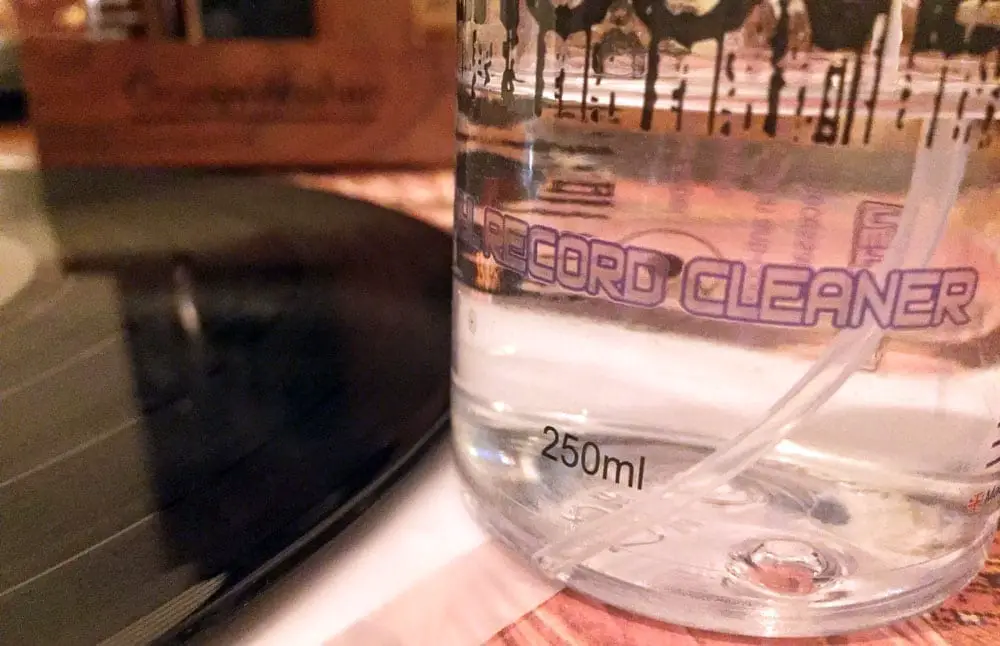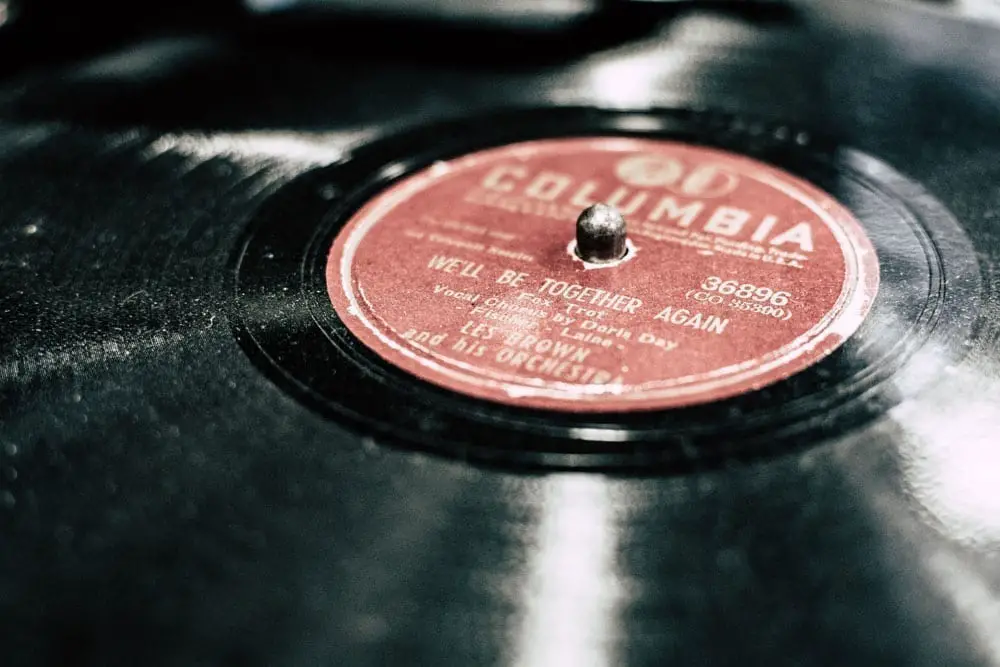Can You Clean A Dvd With Alcohol
At that place is much fence among the vinyl community around the use of booze to clean vinyl records. Isopropyl alcohol, in particular, is popular with many collectors as a key ingredient in homemade record cleaning solutions. Only is it safe? Some collectors swear by it, others warn of potential hazards. To aid shed some light on the topic, we've done a piddling further earthworks.

Many cleaning product manufacturers err on the side of caution when considering alcohol as a tape cleaning ingredient. In our previous interview with GrooveWasher founder, Steve Chase, he explained why the creator of the original 1970'due south Discwasher, Dr Bruce Maier stayed clear of high amounts of iso alcohol when cleaning vinyl records. "Dr Maier cautioned against fluids with high concentrations of iso alcohol," explains Steve. "He stated that iso alcohol tin can remove plasticizers from the vinyl and make the groove breakable. Our G2 Fluid does not comprise any iso alcohol. Some experts take pride in using high iso alcohol to make clean their records. Only it is not an constructive hard surface cleaner. Information technology evaporates as well quickly to remove the contaminants. Endeavor cleaning whatsoever hard surface with alcohol and y'all will run across how poor a cleaner it is. The grime dries back onto the surface before you can wipe information technology away."
GrooveWasher's concerns about isopropyl alcohol are besides shared by the manufacturers behind the popular Disc Doctor, who state on their website that iso alcohol can "…dissolve shellac surfaces, and cause the leaching of plasticizers from synthetic plastic pressings making them brittle and subject to excess wearable." They don't rule out alcohol entirely, however, adding, "Methyl alcohol should also be avoided; undenatured ethyl alcohol concentrations must be kept to a minimum."
Knowing that GrooveWasher contains a minor amount of alcohol (simply not iso alcohol), I asked Steve Chase to elaborate further. "The alcohol version nosotros utilize dries a little slower than iso, with almost the same solvent and miscibility characteristics", he explains. "The first concern with a cleaning solution is to do no impairment. You tin clean a frail hard surface, similar a vinyl record or shellac finished wood table, with a high booze glass cleaner, only you may destroy the object in the process. Why try to kill a fly with a hammer?! As an affluence of caution, one should accept a bias toward a less powerful cleaning solution that may require multiple cleanings, instead of a powerful, mayhap damaging fluid."


Despite business from many record cleaning manufacturers, there are plenty of advocates for the use of iso alcohol. One commentator from the now defunct website record-cleaner.co.uk wrote with conviction, challenge that isopropyl alcohol is safe. In brusque, "Nearly all records are made from Vinyl (polyvinyl chloride) which has excellent solvent resistant properties. The chance of isopropanol in any dilution causing a reaction is theoretically impossible."
Our main commentator, Steve is aware of these arguments and was quick to solidify their position. "One statement I've seen on the audio forums is the claim that high alcohol doesn't harm the PVC vinyl that makes upwards the majority of the ingredients in tape vinyl. However, just considering PVC vinyl is resistant to iso doesn't mean we should select it as a cleaning ingredient. The record may look clean only has the dirt dried dorsum in the grooves?"

"When we experimented with the chemical families that Dr Maier used for his Discwasher record cleaning fluids, we found reaction tables for PVC vinyl, like this 1. Equally y'all can run into, isopropanol doesn't react with PVC. Add together acetic acrid to it, even so, and it melts PVC!"

"Given the choice, we decided not to use isopropanol. It smells like a hospital and dries too fast, from our experiments, compared to the alternatives. We use a pocket-size amount of alcohol (non-iso) in our G2 Fluid and SC1 Stylus Cleaning Fluid, mainly equally a blending amanuensis. All of the ingredients in our fluids are water-loving and blend speedily. The combination works well."
The olfactory property of an alcohol-rich cleaner is rather unpleasant, as I was reminded when recently excavation out an old container of Clear Groove, which has a much higher quantity of alcohol than GrooveWasher.
The most alarming claim most iso-alcohol is that it can remove the "protective coating" of the groove. And so while they might sound improve at first, there is reportedly a run a risk that repeated utilise tin irreversibly damage the groove.
However, when I dug deeper to find information on this supposed protective layer, I couldn't find much data, anything I did find seemed to suggest that it'due south a myth. In that location'due south a expert take chances, I would say, that what they really mean here is the removal or leaching of plasticizers, equally per Dr Bruce Maier's inquiry. Regardless, fears of iso booze's effect on the vinyl tape surface are adequately widespread, just despite these concerns, the internet (and the market for that thing) is brimful with cleaning solutions that contain iso booze, often in quite high quantities.
Steve Chase added farther annotate on DIY cleaning, suggesting that while it might be rubber when used sparingly, it'southward not GrooveWasher's preferred or recommended arroyo. "Isopropyl alcohol, in low concentration to total volume, appears to be safety to use on vinyl records", explains Steve. "Nosotros don't like it. Merely information technology is very popular with DIY record cleaning fluid makers. Some of the recipes we have seen are pretty scary. Once again, nosotros choose to use an abundance of circumspection with our records."
So is information technology ok to clean vinyl records with alcohol?
The argue surrounding booze and vinyl records will go along for many years to come. I would love to be able to requite you a decisive determination to this commodity, simply the truth is, it's hard to draw a precise resolution one way or another.
I would say that while at that place seems to be a solid argument for isopropyl alcohol in lower quantities, erring on the side of caution seems sensible in the longer term. I would echo Steve's preference for a moderate approach that might crave you to echo the process, rather than a heavy-handed approach that may pose some risk.
There appears to be some danger should the iso alcohol mix with whatever acetic acid, and given that acerb acrid is found in vinegar, that alone presents some opportunity for problems (believe information technology or not there are some folk out there who will advocate cleaning vinyl records with vinegar. Crazy).
If you do decide to use isopropyl alcohol as part of your cleaning process, I would at to the lowest degree recommend rinsing the tape after with distilled water to wash away any remnants left behind. In the instance of shellac records, of course, booze-based record cleaners are a huge no-no.
Source: https://www.yoursoundmatters.com/is-it-safe-to-clean-vinyl-records-with-alcohol/
Posted by: moynihangrately.blogspot.com


0 Response to "Can You Clean A Dvd With Alcohol"
Post a Comment